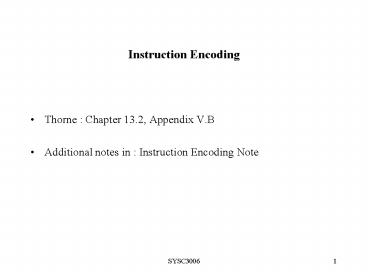Instruction Encoding - PowerPoint PPT Presentation
Title: Instruction Encoding
1
Instruction Encoding
- Thorne Chapter 13.2, Appendix V.B
- Additional notes in Instruction Encoding Note
2
Instruction Encoding
- On the Intel 8086, an instruction is a sequence
of 1..6 bytes - A simple (and incomplete) model of an instruction
is as follows
Byte 1
Byte 2
Byte 3
Byte 4
Byte 5
Byte 6
Opcode
Operand
Operand
Operand
Operand
Operand
Tells what kind of instruction, How many bytes
Source if needed
Destination Operand, if needed
3
Number of Bytes Depends on Number of Operands
- NOP
- INC BX (Thorne, p 668)
- ADD BX, 1 (Thorne, p 667)
1001 0000
0100 0001
1000 0011
1100 0011
0000 0001
0000 0000
Immediate value a word (little endian)
4
Number of Bytes Depends on Addressing Modes
BX AX
00000001
11000011
- ADD BX, AX
- ADD BX, 1
- ADD BL, 1
- ADD BX, 1
- ADD BL, 1
Register
Immediate
10000001
11000011
00000001
00000000
Register
Immediate
00000001
10000000
11000011
Register
Direct
00000011
00011110
00000001
00000000
Direct
Register
00000001
00000000
00000010
00011110
5
Review Earlier Slides on Addressing Modes
- Register mode operand is a register
- Immediate mode operand is a constant
- Constant value is encoding as part of instruction
- value is hard-coded (static)
- Constant value is loaded into IR during fetch
- Constant value obtained from IR during execution
- 3) Direct memory mode operand is address offset
of memory variable - Constant address offset is encoded as part of
instruction - Address offset is hard-coded (static) although
contents of address may be dynamic - During execution, the address offset is
implicitly combined with DS
6
Number of Bytes Depends on Addressing Modes
Indirect Addressing Modes
Assume WORD PTR
- ADD BX, 1
- ADD BX2, 1
- ADD BXSI, 1
- ADD BXSI2, 1
Indirect
Immediate
10000001
00000111
00000001
00000000
Immediate
Based
Constant
00000010
10000001
01000111
00000001
00000000
Immediate
Base-Index
10000001
00000000
00000001
00000000
Immediate
Base-Index with
Constant
00000010
10000001
01000000
00000001
00000000
7
Review Earlier Slides on Addressing Modes
- Indirect Operand is an address offset held in a
register - Based or Indexed Indirect Operand is an address
offset held in a register and a constant offset - During fetch, constant offset is read in as part
of instruction - During execution, CPU uses temporary register to
calculate BX constant - It then accesses memory addressed by BX
constant - 3) Base-Index Operand is an address offset held
in two register - During execution, CPU calculates sum of 2
registers - It then accesses memory addressed by sum
- 4) Base-Index with Displacement Like
based-indexed mode, except includes a constant
too - During execution, CPU calculates sum of 3 values
- It then accesses memory addressed by sum
BX
BX2
BXSI
BXSI2
8
Instruction Encoding J
- On all jump instructions, the target must supply
a value that will be used to modify the IP - Absolute addressing (Assembly code) The
instruction contains a 16-bit constant value to
replace the IP - Execution Semantics IP new value
- Relative addressing (Machine code) The
instruction contains a value to be added to IP
(after the fetch!) - Execution Semantics IP IP value
- If the value is positive, the jump is forward
- If the value is negative, the jump is
negative - Register/memory indirect addressing The
instruction specifies a register or memory
location that contains the value to be used to
replace IP - Execution Semantics IP memaddrs
- IP register
9
Specifying Control Flow Targets (Intra-segment)
- Question What addressing modes is used below ?
- JMP 1000h
- JMP here
10
JMP target Unconditional JUMP
- Control is always transferred to specified
(relative) target. - Relative Addressing Example .LST file fragment
- address machine instruction ASM instruction
- (memory contents)
- 0034H E9 10 02 JMP here
- 0037H . .
- . . .
- 0247 here
- start of fetch IP 0034H IR ????????
- after fetch IP 0037H IR E9 10 02
- after execute IP 0247H IR E9 10 02
Relative addressing
JMP 247 Absolute addressing
(Little endian0210h)































